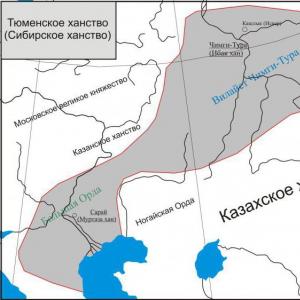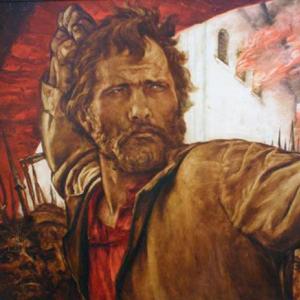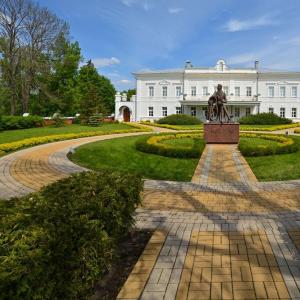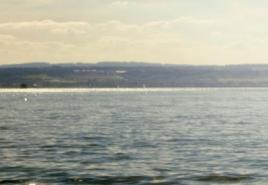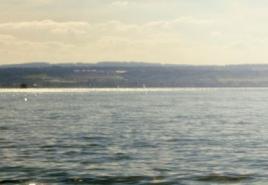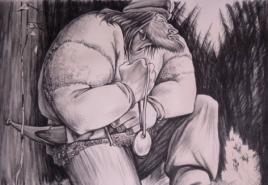Quotes on the topic of man and society. Man and society
Final essay on literature 2018. Topic of the final essay on literature. "Human and society".
FIPI comment: "For the topics of this direction, the view of a person as a representative of society is relevant. Society largely shapes the personality, but the personality is also capable of influencing society. Topics will allow us to consider the problem of personality and society from different angles: from the point of view of their harmonious interaction, complex confrontation or irreconcilable It is equally important to think about the conditions under which a person must obey social laws, and society must take into account the interests of each person. Literature has always shown interest in the problem of relations between man and society, the creative or destructive consequences of this interaction for the individual and for human civilization. " ...
So, let's try to figure out from what positions these two concepts can be viewed.
1. Personality and society (in agreement or in opposition).Within the framework of this subsection, one can talk about the following topics: Man as part of society. Impossibility of human existence outside of society. Independence of judgment of a single individual. The influence of society on human decisions, the influence of public opinion on a person's tastes, his life position. Confrontation or conflict between society and an individual. A person's desire to become special, original. Contrasting the interests of a person and the interests of society. The ability to devote his life to the interests of society, philanthropy and misanthropy. The influence of the individual on society. The place of a person in society. The attitude of a person to society, his own kind.
2. Social norms and laws, morality. Responsibility of a person to society and society to a person for everything that happens and the future. A person's decision to accept or reject the laws of the society in which he lives, to follow the norms or break the laws.
3. Man and society in the historical, state plan.The role of personality in history. The connection between time and society. Evolution of society.
4. Man and society in a totalitarian state.Erasure of individuality in society. The indifference of society to its future and a bright personality capable of fighting the system. Contrasting the “crowd” and “personality” in a totalitarian regime. Diseases of society. Alcoholism, drug addiction, lack of tolerance, cruelty and crime
PERSON - a term used in two main senses: biological and social. In the biological sense, man is a representative of the species Homo sapiens, a family of hominids, a detachment of primates, a class of mammals - the highest stage in the development of organic life on Earth.
In a social sense man is a creature that has arisen in a team, reproduces and develops in a team. Historically established norms of law, morality, everyday life, rules of thinking and language, aesthetic tastes, etc. shape the behavior and mind of a person, make an individual person a representative of a certain way of life, culture and psychology. Man is an elementary unit of various groups and communities, including ethnic groups, states, etc., where he acts as a person. Recognized in international organizations and in the legislation of states "human rights" are primarily the rights of the individual.
Synonyms: face, personality, person, person, individual, individuality, soul, unit, bipedal, human being, individual, king of nature, someone, working unit.
SOCIETY - in a broad sense, a large group of people united by a common goal with stable social boundaries. The term society can be applied to all of humanity (human society), to the historical stage in the development of all mankind or its individual parts (slave society, feudal society, etc. (see Socio-economic formation), to the inhabitants of the state (American society, Russian society, etc.) and to individual organizations of people (sports society, geographic society, etc.).
Sociological concepts of society differed primarily in the interpretation of the nature of the compatibility of human existence, in the explanation of the principle of the formation of social ties. O. Comte saw such a principle in the division of functions (labor) and in solidarity, E. Durkheim - in cultural artifacts, which he called "collective representations." M. Weber called the unifying principle mutually oriented, that is, social, actions of people. Structural functionalism considered social norms and values \u200b\u200bto be the basis of the social system. K. Marx and F. Engels viewed the development of society as a natural-historical process of change of socio-economic formations, which are based on a certain way of people's production activity. Its specificity is determined by production relations independent of people's consciousness, corresponding to the achieved level of productive forces. On the basis of these objective, material relations, systems of corresponding social and political institutions, ideological relations, and forms of consciousness are being built. Thanks to this understanding, each socio-economic formation appears as a holistic concrete historical social organism, characterized by its economic and social structure, value-normative system of social regulation, characteristics and spiritual life.
The current stage of development of society is characterized by the growth of integration processes against the background of the increasing diversity of economic, political and ideological forms. Scientific, technical and social progress, having resolved some contradictions, gave rise to others, even more acute, confronted human civilization with global problems, on the solution of which the very existence of society and the ways of its further development depend.
Synonyms:society, people, community, herd; crowd; public, environment, environment, audience, humanity, light, human race, human race, brotherhood, brothers, gang, group.
Quotes for the final essay 2018 in the direction "Man and Society".
People think about us what we want to inspire them. T. Dreiser
Frivolous light mercilessly drives away what is allowed in theory. (A.S. Pushkin)
Man is created for society. He is unable and does not have the courage to live alone. (W. Blackstone)
We were born to unite with our brothers - people and with all the human race (Cicero)
We need fellowship more than anything else. (D. M. Cage)
A person becomes a person only among people. (I. Becher)
Individual people are united into one whole - into a society; and therefore the highest sphere of beauty is human society. (N.G. Chernyshevsky)
If you want to influence other people, then you have to be a person who really stimulates and moves other people forward. (K. Marx)
A person does not begin to live before he rises above the narrow frames of his personal opinions and beliefs and does not join the convictions of all mankind. (M.L. King)
People's characters are determined and shaped by their relationships. (A. Maurois)
Nature creates man, but develops and forms his society. (V.G.Belinsky)
Society is a capricious being, disposed towards those who indulge its whims, and not at all towards those who contribute to its development. (V.G. Krotov)
Society degrades if it does not receive impulses from individuals; an impulse degrades if it does not receive sympathy from the whole society. (W. James)
Society consists of two classes of people: those who have dinner, but no appetite; and those with a great appetite but no lunch. (N. Shamfort)
A truly honest person should prefer family to himself, fatherland to family, and humanity to fatherland. (J. D'Alembert)
You don't need to be the greatest genius to do great things; you don't need to be taller than people, you need to be with them. (C. Montesquieu)
To break away from the people is like losing your mind. (Karak)
A man without people is like a body without a soul.
You will never die with the people.
The most wonderful Life Is a life lived for other people. (H. Keller)
There are people who, like a bridge, exist so that others can cross it. And they run, they run; no one will look back, will not look at the feet. And the bridge serves this, and the other, and the third generation. (V.V. Rozanov)
Destroy society, and you will destroy the unity of the human race - the unity that sustains life ... (Seneca the Younger)
A person cannot live in solitude, he needs society. (I. Goethe)
Only in people can a person know himself. (I. Goethe)
Anyone who loves loneliness is either a wild beast or the Lord God. (F. Bacon)
Alone, man is either a saint or a devil. (R. Burton)
If people bother you, then you have no reason to live. (L. N. Tolstoy)
A person can do without a lot, but not without a person. (C.L.Burne)
Man exists only in society, and society forms it only for itself.
(L. Bonald
In the soul of every person there is a miniature portrait of his people. (G. Freytag)
Human society ... is like a rippling sea in which individuals, like waves,
surrounded by their own kind, constantly collide with each other, arise, grow and disappear, and the sea - society - always rages, worries and does not stop ... (P. A. Sorokin)
A living person carries the life of society in his spirit, in his heart, in his blood: he suffers from his ailments, suffers from his sufferings, blooms with his health, is blissful with his happiness ... (V.G.Belinsky)
It can be said without exaggeration that a person's happiness depends solely on the characteristics of his social life. (D. I. Pisarev)
Every person has something of all people. (K. Lichtenberg)
Unite people! Look: zero is nothing, but two zeros already mean something. (S. E. Lets)
Together to search - to find everything.
Those sailing in a boat have one fate.
Man is a creature so flexible and in social life so sensitive to the opinions of other people ... (C. Montesquieu)
He who fled from the people remains without burial.
Among people, the fox will not die of hunger.
Man is a support for man.
He who does not love his people does not love someone else's either.
Working for the people is the most urgent task. (V. Hugo)
A person in society should grow according to his nature, be himself and the only one, as on a tree each leaf is different from another. But each leaf has something in common with others, and this community runs over the knots, vessels and forms the power of the trunk and the unity of the whole tree. (M. M. Prishvin)
No matter how rich and luxurious the inner life of a person is, no matter how hot key it beats in
outside and no matter what waves it pours over the edge, it is not complete if it does not assimilate into its content the interests of the external world, society and humanity. (V.G.Belinsky)
Man was created to live in society; separate him from him, isolate him - his thoughts will get confused, his character will harden, hundreds of absurd passions will arise in his soul, extravagant ideas will sprout in his brain like a wild thorn among a wasteland. (D. Diderot)
Being human means not only possessing knowledge, but also doing for future generations what those who preceded us did for us. (G. Lichtenberg)
Each person is a separate definite personality, which will not be a second time. People differ in the very essence of the soul; their similarity is only superficial. The more a person becomes by himself, the deeper he begins to understand himself - his distinctive features become clearer. (V.Ya.Bryusov)
People were born for each other. (M. Aurelius)
The best among people is the one who benefits others most. (Jami)
Man is a wolf to man. (Plautus)
There are two opposite principles in human nature: self-love, which attracts us to ourselves, and virtue, which pushes us to others. If one of these springs broke, the person would be mad to the point of madness or magnanimous to madness. (D. Diderot)
We can bring salvation to humanity only by our own good behavior; otherwise we will rush like a fatal comet, leaving devastation and death everywhere behind us. (E. Rotterdam)
The earthly purpose of man is to be intelligent and brave, free, possessive and happy ...
Humanists need to be implacable and raise their arms whenever hostile forces want to obstruct a person's appointment. (G. Mann)
Wherever you find yourself, people will always be no more stupid than you. (D. Diderot)
Each person is responsible to all people for all people and for everything. (F.M.Dostoevsky)
A person loves society, be it even the society of a lonely burning candle. (G. Lichtenberg)
No society can be worse than the people of which it is composed. (V. Schwebel)
Society is like air: it is necessary for breathing, but not enough for life. (D. Santayana)
All societies are similar to each other like cows in a herd, only some have gilded horns. (V. Schwebel)
Society is a set of stones that would collapse if one did not support the other. (L.A. Seneca)
Terror has invented no other means to equalize society than to chop off heads that rise above the level of mediocrity. (P. Bouast)
Society is always in a conspiracy against a person. Conformity is considered a virtue; self-confidence is a sin. Society does not love a person and life, but names and customs. (R. Emerson)
You cannot live in society and be free from society. (V.I.Lenin)
It is common for every generation to consider itself called upon to remake the world. (A. Camus)
Society cannot free itself without freeing every single person. (F. Engels)
Anyone who tries to get out of the common herd becomes a public enemy. Why, pray tell? (F. Petrarch)
No matter how selfish a person may seem, certain laws are clearly laid in his nature that make him interested in the fate of others and consider their happiness necessary for himself, although he himself does not get anything from this, except for the pleasure of seeing this happiness. (A. Smith)
The overwhelming majority of people ... are not able to think independently, but only to believe, and ... not able to obey reason, but only to power. (A. Schopenhauer)
It doesn't matter who is in front of you: a crowd of academics or a crowd of water carriers. Both are a crowd. (G. Le Bon)
I never said, "I want to be alone." I just said, "I want to be left alone," which is not the same. (G. Garbo)
What is man created for? Is he able to exist in solitude? Does he have the courage to live alone? According to W. Blackstone, man is created for society. We are not able to live alone. It is impossible not to agree with this statement. Undoubtedly, a person is a part of society, and he exists by interacting with other people. He does not have enough stamina or courage to constantly be alone. A person always turns to another for sympathy, compassion, moral support, without which it is impossible to overcome melancholy, grief, mental pain.
So it was with the hero of AP Chekhov's story "Tosca" - a St. Petersburg cabman Iona Potapov, whose son, a young cabman, died. The inconsolable father, immersed in melancholy, is looking for someone who would listen to him, expressed sympathy for him. It is not for nothing that they say: "Death is red in the world." Grief will become easier if you are heard. Unfortunately, Jonah in the huge city did not find anyone who would show sympathy for him. Only the horse in the stable, carefully chewing the hay, seemed to listen carefully to Jonah when he told how his son caught a cold, how he got sick and how he died in the hospital.
But the hero of another story by AP Chekhov, "Ionych", deliberately separated himself from the society of the provincial town of S., because he considered those around him to be ignorant, stupid, unworthy of attention. But Doctor Dmitry Ionych Startsev himself, in terms of his moral development, turned out to be even lower than the environment in which he was. He became a pagan idol, devoting his life to the accumulation of wealth.
Thus, a person cannot exist without society. Firstly, everyone needs understanding and support, sympathy from others. Secondly, outside of society, a person ceases to develop, spiritually degrades.
Updated: 2017-10-11
Attention!
Thanks for your attention.
If you notice an error or typo, select the text and press Ctrl + Enter.
Thus, you will be of invaluable benefit to the project and other readers.
Useful material on the topic
- Do you agree with the statement of J. Fowles: “A craftsman and a real artist differ in that one knows what he is capable of, and the other does not; that's why one occupation does not threaten anything, while the other is fraught with all sorts of dangers?
Is it possible to live in society and be free from it?
Man is created for society.
He is incapable and has no courage
live alone. (W. Blackstone)
Whether we want to admit it or not, each of us is born and raised in a team, changes, develops, acquires certain skills, attitudes, psychology thanks to the influence of other people. And isolation would lead to a complete degradation of the personality or the absence of personality as such in a person. Why this happens is not difficult to understand: society is a social phenomenon that develops historically. And a person included in society is somehow “forced” to adopt the culture, language, morality and views of this association of people, becoming a bearer of their language, morality and culture. As V.I. Lenin, "you cannot live in society and be free from society."
Is it possible to live in a society of people and not depend on their opinions, morals, views, rules, laws, that is, to be free? Literature answers these and other questions, considering the person and society in unity.
F.M. In the philosophical novel Crime and Punishment, Dostoevsky creates the image of Rodion Raskolnikov, who “tried” to oppose himself to people, to the social environment that, according to the hero, breaks a person, makes him a victim, weak and powerless. To save a person from social insanity - it is this task that leads Raskolnikov to a completely immoral theory about the "powerful of this world" who can commit crimes, transcend social laws, that is, live in society and "be free" from it. The hero of the novel referred himself to such free personalities. And he miscalculated: the clearly immoral theory of internal and external freedom, independence from people led him to moral suffering.
Let's remember Robinson Crusoe (Daniel Defoe "Treasure Island"), who found himself on a desert island due to external circumstances. Here, it would seem, she is, such a desired freedom! It didn’t work “to be free from society”. Even the daily work of arranging a home, growing food, obtaining food and clothing did not save the hero from loneliness. The desire to be among people, the desire to communicate with them became for him the main dream in a new life. He could not learn to be free from everyone.
Of course, social societies are diverse. Their aspirations, views, laws, too. And in literature, the hero's opposition to society is a favorite topic.
classic writers. Chatsky, Pechorin, Bazarov, Rudin, even Larra with his immorality and selfishness. The fate of these heroes is tragic. If only because, living in society, they rejected this society, trying to find "freedom." But the point is that each of us, being a part of the common, should not deny this common, but fight for its "purity" and morality. As D. Medvedev said, society will only become progressive in all senses when each of us begins to work on ourselves, and not to oppose everyone.
(414 words).
How do teenagers understand the laws by which modern society lives?
Text: Anna Chainikova, teacher of Russian and literature at school No. 171
Photo: proza.ru
Graduates will test their analysis skills next week literary works... Will they be able to reveal the topic? Find the right arguments? Will they fit into the evaluation criteria? We will find out very soon. In the meantime, we offer you an analysis of the fifth thematic area - "Man and Society". You still have time to use our advice.
FIPI comment:
For the topics of this direction, the view of a person as a representative of society is relevant. Society in many respects shapes the personality, but the personality is also capable of influencing society. Themes will allow us to consider the problem of the individual and society from different sides: from the point of view of their harmonious interaction, complex confrontation or irreconcilable conflict. It is equally important to think about the conditions under which a person should obey social laws, and society should take into account the interests of each person. Literature has always shown interest in the problem of the relationship between man and society, the creative or destructive consequences of this interaction for the individual and for human civilization.
Vocabulary work
Explanatory dictionary by T.F. Efremova:
MAN - 1. A living being, unlike an animal, has the gift of speech, thought and the ability to produce tools and use them. 2. Carrier of any qualities, properties (usually with a definition); personality.
SOCIETY - 1. A set of people united by historically conditioned social forms of common life and activity. 2. A circle of people united by a common position, origin, interests. 3. The circle of people with whom someone is in close contact; Wednesday.
Synonyms
Person: personality, individual.
Society: society, environment, environment.
Man and society are closely interconnected and cannot exist without each other. Man is a social being, he was created for society and from early childhood is in it. It is society that develops, shapes a person, in many respects it depends on the environment and environment what a person will become. If, due to various reasons (conscious choice, chance, exile and isolation, used as punishment) a person finds himself outside of society, he loses part of himself, feels lost, experiences loneliness, and often degrades.
The problem of interaction between the individual and society worried many writers and poets. What can this relationship be like? What are they built on?
Relationships can be harmonious when a person and society are in unity, they can be built on confrontation, the struggle of an individual and society, and maybe on an open irreconcilable conflict.
Often, heroes challenge society and oppose themselves to the world. In literature, this is especially common in the works of the era of romanticism.
In the story "Old Woman Izergil" Maxim Gorkytelling the story of Larra, invites the reader to think about the question of whether a person can exist outside of society. The son of a proud free eagle and an earthly woman, Larra despises the laws of society and the people who invented them. The young man considers himself exceptional, does not recognize authorities and does not see the need for people: “… He, boldly looking at them, answered that there were no more people like him; and if everyone honors them - he does not want to do it "... Disregarding the laws of the tribe in which he found himself, Larra continues to live as he lived before, but refusal to obey the norms of society entails exile. The tribal elders say to the audacious youth: “He has no place among us! Let him go wherever he wants”- but this only makes the son of a proud eagle laugh, because he is used to freedom and does not consider loneliness a punishment. But can freedom become painful? Yes, turning into loneliness, she will become a punishment, says Maxim Gorky. Coming up with the punishment for the murder of a girl, choosing from the most severe and cruel, the tribe cannot choose one that satisfies everyone. “There is a punishment. This is a terrible punishment; you will not invent such a thing in a thousand years! The punishment for him is in himself! Let him go, let him be free "- says the sage. Larra's name is symbolic: "Outcast, thrown out".
Why, then, what at first aroused the laughter of Larra, “who remained free like his father,” turned into suffering and turned out to be a real punishment? A person is a social being, therefore he cannot live outside society, Gorky claims, and Larra, although he was the son of an eagle, was still half human. “There was so much melancholy in his eyes that he could have poisoned all the people of the world with it. So, from that time on he was left alone, free, awaiting death. And so he walks, walks everywhere ... You see, he has already become like a shadow and will be like that forever! He does not understand people's speech or their actions - nothing. And everything seeks, walks, walks ... He has no life, and death does not smile at him. And there is no place for him among people ... This is how the man was amazed for his pride! " Torn from society, Larra seeks death, but does not find it. Saying "the punishment to him is in himself", the sages who comprehended the social nature of man predicted a painful test of loneliness and isolation for the proud young man who challenged society. The way Larra suffers only confirms the idea that a person cannot exist outside of society.
The hero of another legend, told by the old woman Izergil, becomes Danko, the absolute opposite of Larra. Danko does not oppose himself to society, but merges with it. At the cost of his own life, he saves desperate people, leads them out of the impenetrable forest, illuminating the path with his burning heart torn from his chest. Danko accomplishes the feat not because he expects gratitude and praise, but because he loves people. His act is selfless and altruistic. He exists for the sake of people and their good, and even in those moments when people who followed him shower him with reproaches and indignation boils in his heart, Danko does not turn away from them: "He loved people and thought that maybe they would die without him.". "What will I do for people ?!" - exclaims the hero, tearing a flaming heart out of his chest.
Danko is an example of nobility and great love for people. It is this romantic hero that becomes Gorky's ideal. A person, according to the writer, should live with people and for the sake of people, not close in himself, not be a selfish individualist, and he can be happy only in society.
Aphorisms and sayings of famous people
- All roads lead to people. (A. de Saint-Exupery)
- Man is created for society. He is unable and does not have the courage to live alone. (W. Blackstone)
- Nature creates man, but develops and forms his society. (V.G.Belinsky)
- Society is a set of stones that would collapse if one did not support the other. (Seneca)
- Anyone who loves loneliness is either a wild beast or the Lord God. (F. Bacon)
- Man was created to live in society; separate him from him, isolate him - his thoughts will get confused, his character will harden, hundreds of absurd passions will arise in his soul, extravagant ideas will sprout in his brain like a wild thorn among a wasteland. (D. Diderot)
- Society is like air: it is necessary for breathing, but not enough for life. (D. Santayana)
- There is no dependence more bitter and humiliating than dependence on human will, on the arbitrariness of one's peers. (N. A. Berdyaev)
- Do not focus on public opinion... This is not a lighthouse, but wandering lights. (A. Maurois)
- It is common for every generation to consider itself called upon to remake the world. (A. Camus)
What questions are worth considering?
- How is the conflict between man and society manifested?
- Can a person win the fight against society?
- Can a person change society?
- Can a person exist outside of society?
- Can a person remain civilized outside of society?
- What happens to a person cut off from society?
- Can a person become a person in isolation from society?
- Why is it important to maintain individuality?
- Do I need to express my opinion if it differs from the opinion of the majority?
- What is more important: personal interests or the interests of society?
- Is it possible to live in society and be free from it?
- Where does the violation of social norms lead?
- What person can be called dangerous to society?
- Is a person responsible to society for their actions?
- What does the indifference of society to man lead to?
- How does society treat people who are very different from it?
"Human and society"
FIPI official comment:
For the topics of this direction, the view of a person as a representative of society is relevant. Society in many respects shapes the personality, but the personality is also capable of influencing society. Themes will allow us to consider the problem of the individual and society from different sides: from the point of view of their harmonious interaction, complex confrontation or irreconcilable conflict. It is equally important to think about the conditions under which a person should obey social laws, and society should take into account the interests of each person. Literature has always shown interest in the problem of the relationship between man and society, the creative or destructive consequences of this interaction for the individual and for human civilization.
Vocabulary work:
Man is a living being, in contrast to an animal possessing the gift of speech and thought and the ability to create and use tools in the process of social labor, the owner of the best moral and intellectual properties.
Society is a set of definite relations of production that forms a special stage of development in the history of mankind.
An organization, an association of people who set themselves some common tasks.
Aphorisms and sayings of famous people
“Man is created for society. He is not able and does not have the courage to live alone "W. Blackstone
"We were born to unite with our brothers - people and with all the human race" Cicero
"Nature creates man, but society develops and forms him" V. G. Belinsky
"Society is a capricious being, disposed to those who indulge its whims, and not at all to those who contribute to its development" V. G. Krotov
“You don't need to be the greatest genius to do great things; you don't need to be taller than people, you need to be with them "C. Montesquieu
“A man without people is like a body without a soul. You will never die with the people. ... The most wonderful life is a life lived for other people "H. Keller
"If people bother you, then you have no reason to live" L. N. Tolstoy
"It can be said without exaggeration that a person's happiness depends solely on the characteristics of his social life" D. I. Pisarev
“There is no more bitter and humiliating dependence than dependence on human will, on the arbitrariness of those equal to oneself” N.А. Berdyaev
"Thoughts of the best minds always end up becoming the opinion of society" F. Chesterfield
“You shouldn't be guided by public opinion. This is not a lighthouse, but wandering lights "A. Maurois
“Every person is the center of the world, but exactly everyone, and the world is only valuable because it is full of such centers” E. Canetti
“To be human means not only to have knowledge, but also to do for future generations what those who preceded did for us”
G. Lichtenberg
"All roads lead to people" A. de Saint-Exupery
Methodist comments:
The emergence of a person and the emergence of society are a single process. No person - no society. If there is no society, there is no man.
In the social sense, a person is a being that has arisen in a team, reproduces and develops in a team. Historically established norms of law, morality, everyday life, rules of thinking and language, aesthetic tastes form a personality, make an individual a representative of a certain way of life, culture and psychology.
What do we call society?
In a narrow sense, society is a collection of people who realize that they have constant common interestswho can be satisfied best only by their own actions. In a broad sense, society is part of the world. It includes not only all living people. Society is characterized by continuous development, which means that it has
present, past and future. Generations of people who lived in the distant and very recent past have not left without a trace. From them, people living now received language, science, art, and practical skills. If it were not so, then every generation would have to start with the invention of the stone ax.
So, society is all of humanity in its history, modernity and perspective. The unification of people in a society does not depend on someone's desire. Entry into human society does not take place on the basis of a declaration: every person born is naturally included in the life of society.
How does society affect a person? Is one person capable of changing society? Can a person remain civilized outside of society? Literature answers these questions, the subject of which is man and personality in the unity of their world perception and world outlook.

